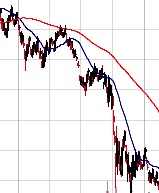Part 5 of 6

Then the bottom fell out.
Of course, the bottom didn’t only drop out on the world of the concert-giving organizations; it was systemic.
It crossed every boundary, every country, every business.
It was incredible.
Many people lost their jobs. Many businesses failed.
It was a free-fall. And it kept falling.
Everyone thought there would be a bottom, but each month the crisis deepened.
Even the banks were in trouble, and certain large companies too. But they got massive government help so they survived.
This support said much about the values of the time.
As for the organizations in our story though, there’s was a different outcome.
The crisis happened so fast that very few could react quickly enough. This was because many behaviors of the organizations’ traditional supporters had changed, almost overnight.
Businesses could not continue to fill the role of philanthropist.
Foundations lost holdings in the stock markets to such a degree that they had to cut their support. Some failed completely.
Donors delayed gifts, lowered giving levels or discontinued support entirely.
Many found themselves having to choose between supporting causes for basic human needs or for Art. It was not an easy decision for some of them, but many did not choose the second option. Given the degree of suffering this was entirely understandable.
Purchasing patterns changed as well. When the crisis occurred ticket buyers made choices that made perfect sense within the new normalcy of their lives.
Subscribers purchased smaller packages or became single-ticket buyers.
The single-ticket-buyers stayed home. They didn’t need to buy a ticket to watch television or surf the Internet – while concert tickets were suddenly perceived as being too expensive for the value they offered.
There were also reasons for the behavioral changes that were not based completely on the financial situation. The crisis had simply accelerated those changes.
Faced with diminishing resources people embraced that which felt most relevant. They dropped all that seemed extraneous.
Many had already been increasingly replacing the traditional experiences with the fruits of new technologies that felt more relevant to their modern world.
As for those old behaviors of going to concerts as a way of claiming social status, there had been a complete re-ordering of what was acceptable and even what was admirable.
People did not go to concerts to announce they had arrived anymore. Frankly, that could be accomplished by simply owning the most popular smart phone or the newest personal listening device. One could now purchase one’s status.
As a delivery system for music, then, the concerts were no longer deemed essential.
Suddenly the organizations realized that they had not changed fast enough.
They had lost a generation – even those who were now listening to the same music they were producing. It was now coming to the listeners in entirely new, entirely personalized platforms. Virtually the entire universe of music was now available on a portable device that could easily fit inside a pocket.
The monopoly of the past century was finished.
All seemed lost.

John
I am enjoying this immensely. Wish I had started on Day 1 because I was almost entirely through this number 5 before I could stop reading. Looking forward to 6, and beyond.
Thanks for this. Mike Levin